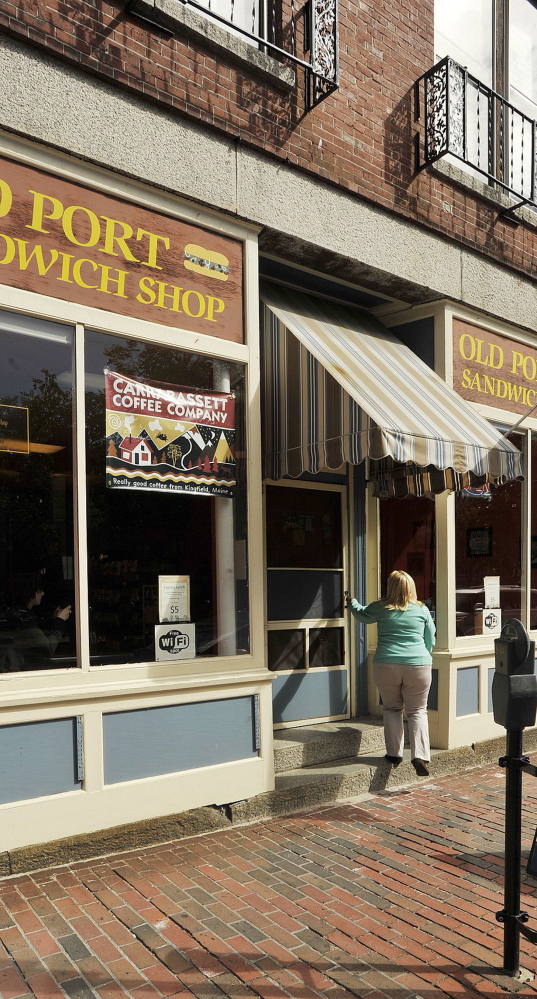Kathleen Tutone said she wants to pay her workers a good wage – all employees at her Tree House Toys store on Exchange Street in Portland already make more than the state minimum of $7.50 an hour, she said.
But a proposal to make the city’s minimum wage $15 an hour, which could be on the ballot this fall if the Portland Green Independent Committee gathers enough signatures this spring, would require big changes at her business.
“I don’t think I could run my store with fewer employees,” she said. But she would likely have to cut workers’ hours if such an increase went into effect, she said.
An alternative proposal backed by Mayor Michael Brennan calls for a more moderate minimum wage increase in the city, to $9.50 an hour on July 1, then $10.10 an hour on Jan. 1, 2016, and $10.68 on Jan. 1, 2017. Annual cost-of-living adjustments would follow every Jan. 1.
Portland’s two initiatives are being debated as a half-dozen minimum wage bills wend their way through the State House.
Nationally, the minimum wage is $7.25, where it has been since 2009. Sixteen states have scheduled wage increases, ranging from Arkansas’ 50-cent increase to $8 an hour on Jan. 1 – to Massachusetts, where the minimum will rise to $10 an hour next year and $11 an hour in 2017. Seattle’s minimum wage rose to $11 an hour this month and will climb to as much as $15 over the next seven years, depending on the size of the business and whether workers are provided with health care coverage.
Brennan said his proposal, which goes before the City Council’s Finance Committee on Thursday afternoon, is modest and isn’t intended to provide a “living wage,” which is generally considered to be at least $15 an hour in Portland.
“This is a good, solid proposal,” Brennan said, to boost living standards of workers without causing undue harm to businesses.
Brennan said it could be a month or more before his plan reaches the full council for a vote, and that could delay the start date from the original target of July 1 to Jan. 1
The proposed $15-an-hour minimum, Brennan said, would especially harm small businesses.
His plan, he said, “doesn’t make Portland an economic outlier.”
Many business owners said they agreed.
Tutone said the $15-an-hour minimum wage makes Brennan’s proposal look attractive.
She noted that a $15 an hour wage carries an even higher cost to business owners, who have to pay Social Security, workers’ compensation and other fees and taxes on top of wages.
That’s an opinion shared by Andrew Lees, the owner of the Old Port Sandwich Shop on Market Street. Like Tutone, Lees said all of his employees already make more than the state minimum.
HURTING WORKERS, BUSINESSES
Lees said he could handle an increase to $9.50 an hour, but would have to cut staff if the minimum wage jumped to $15. This would hurt the very people it was intended to help, he said.
“I’d have to let someone go,” he said. “It would hurt my business and the local economy.”
Joel Baker, the owner of Mister Bagel on Forest Avenue in Portland, has been writing to newspapers, decrying the impact of any minimum wage increase.
He argues that increasing the minimum wage would also force business owners to raise the wages of higher-paid employees. This could force owners to raise prices or close their doors.
Other proposals to increase the minimum wage are under consideration in one other Maine community and at the state level.
The Bangor City Council is considering a proposal to raise that city’s minimum to $8.25 an hour next year and $9.75 an hour in 2018.
The Maine People’s Alliance is supporting legislation to raise the state minimum wage to $12 an hour by 2019, and has hinted it might push for a referendum if the bill goes nowhere or is vetoed by Gov. Paul LePage, which is considered likely if the Legislature approves it.
“We support it, either by legislation or referendum,” said Mike Tipping, the alliance’s communications director.
The group has scheduling a press conference for Thursday, but the topic has not been revealed.
In 2013, LePage vetoed a minimum wage increase to $9 an hour and has said he thinks it is unconstitutional for any community to establish its own minimum wage.
The Portland Regional Chamber also opposes any minimum wage increase in the city and will argue against it during the council’s committee meeting Thursday.
Chris O’Neil, the chamber’s lobbyist, said an increase in Portland could make the city appear hostile to business.
He also said an increase isn’t necessary because surveys suggest that only about 0.3 percent of workers in Portland are paid the minimum wage.
Statewide, only about 3 percent of workers are paid the minimum.
“What are we trying to fix?” O’Neil said.
Send questions/comments to the editors.



